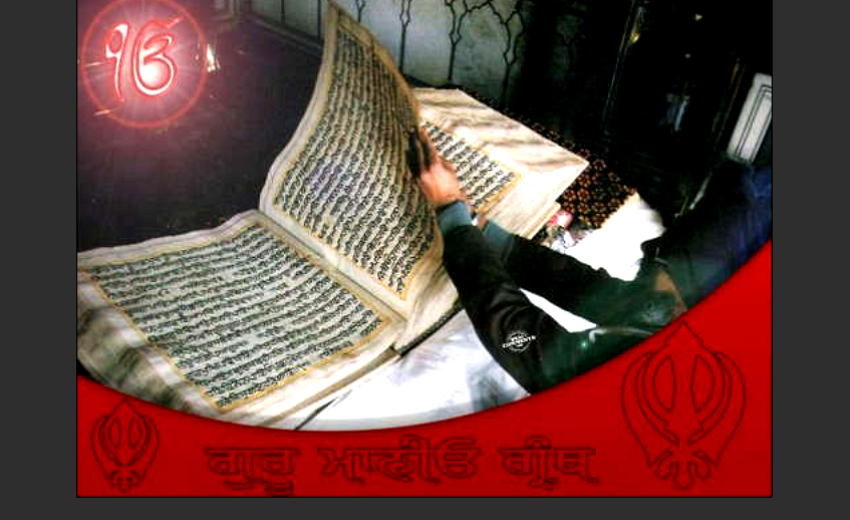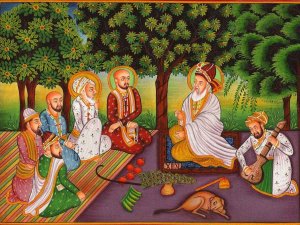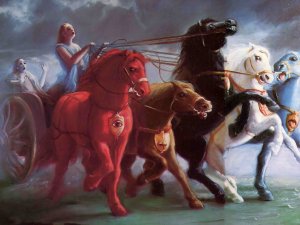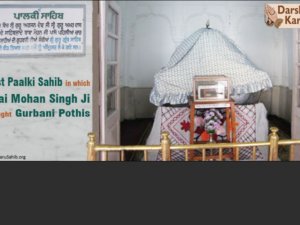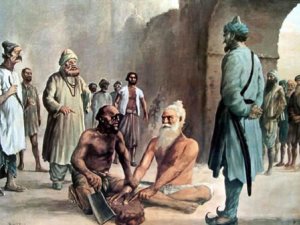Many Hindu, Muslim, Christian and Sikh writers have written that on 21st October, 1708, more than 300 years ago Guru Gobind Singh, the 10th Guru Of the Sikhs, before he left this mortal world for his heavenly abode at Nander, about 400 miles from Bombay, in the present state of Maharashtra in the western part of India, designated the then known "Pothi Sahib" as the Eternal Living Guru of the Sikhs; thus giving it the honorific title of "Guru Granth Sahib".
Bhai Nand Lal, a devoted disciple of Guru Gobind Singh, who was present at the time of Guru's death, tells us in his Rehat Nama (the Sikh Code of Conduct) that the Guru Ji said, "Mera Roop Granth Ji Jann, is Main Bhed Nahin Kuchh Mann", meaning consider the holy Granth as my own image; do not have any doubt about it.
Bhatt Vahi Talanda Parganah, Jind now in the Haryana state also describes the event in the following words:-
'Guru Gobind Singh asked Bhai Daya Singh to bring Guru Granth Sahib. Guru jee placed five Paisas and a coconut before Guru Granth Sahib and bowed before it. He said to the congregation 'I order you to treat Guru Granth Sahib as Guru after me'.
According to Giani Garja Singh, to whom we owe this discovery , Bhatt Vahis are a reliable source of information. The author of this particular Vahi was Narbad Singh Bhatt who was with Guru Gobind Singh at that time at Nander. (These Bhatts recorded events of the lives of the Gurus in their scrolls called Vahis. Some of these Vahis are preserved to this day by their descendants).
A letter written by Mata Sundriji w/o Guru Gobind Singh addressed to the ancestors of Bhai Chet Singh of village Bhai Rupa in Bhatinda district (Punjab) shows that Sri Guru Granth Sahib was invested with the final authority and the Sikhs believed it. Bhai Chet Singh still has this letter.
Bhai Prahalad Singh, another contemporary of Guru Gobind Singh, who has also recorded the Guru's commandment on this issue, writes in his Rehat Nama (Code of Conduct) that Guru Ji said, "Agaya Bhai Akal kee tabeh chalayo panth; Sabh Sikhan ko hukam hai guru manio Granth". 'With the order of the Eternal Lord the (Sikh) Panth has been established. All the Sikhs are hereby commanded to obey the Granth'.
Thus he surrendered his high office of Guruship to Guru Granth Sahib.
Sainapat, who was not only a contemporary of GURU Gobind Singh, but was also one of his trusted courtiers, has written in his book 'Sri Gur Sobha' in 1711, within 3 years after the Guru's death:-
"A day before his death, the Sikhs asked Guru Gobind Singh about the person he was nominating to succeed him. In reply, he said that the Khalsa, his true followers, was his very self and to them he had granted his robe and his physical self. The Eternal and limitless Word uttered with the Supreme Lord's Light (the Granth) is our Supreme Master."
Another document, which is a Sanskrit manuscript, recently published by the Sanskrit university, Varanasi (India), records Guru Gobind Singh's proclamation that the holy scripture will be the Guru after him.
Mohamud Ali Khan Ansari's book' Tarikh-E- Muzafree (1820) page 152, Bute Shah's book ' Tarikh-E- Punjab (1848) page 206 and Syeed Mohamad Latif's book 'History of the Punjab' page 269 also confirm the fact that Guru Gobind Singh designated Guru Granth Sahib The Eternal Guru After him.
Macauliffe, a well known writer of the Sikh History, has written in his book The Sikh Religion (Vol. V P. 244):
"In his farewell message Guru Gobind Singh said to the Khalsa, his followers,' I have entrusted you to the Immortal Lord. I have infused my mental and bodily spirit into the Granth Sahib and the Khalsa. Obey the Granth Sahib. It is the visible body of the Guru'.
Khushwant Singh, a famous Sikh writer, is right when he writes in the introduction of his book, Hymns of the Gurus:
"Guru Gobind Singh divided the concept of Guruship into three, viz, personal, religious and temporal. The first, he said would end with him.
The second would subsist forever in the scripture, and the Granth Sahib was henceforth to be considered as the symbolic representation of the ten Gurus. Temporal leadership he vested in the community. Before the death of Guru Gobind Singh, the Sikh Holy Scripture was called Pothi Sahib or Granth Sahib and not Guru Granth Sahib, which title got affixed only after the commandment of Guru Gobind Singh. Thus, in Sikhism, no living person, however holy or revered, can now assume the title or status of Guru. This was one of the most significant developments in the history of the Sikhs."
It has been felt necessary to discuss this point in detail with the quotations from authentic historical documents because certain cults among Sikhs, who still own personal Gurus, ask for authentic evidence to the effect that Guru Gobind Singh had really named the SGGS his successor. From the above discussion it can be concluded unequivocally that in 1708, more than 300 years ago, Guru Gobind Singh abolished forever, the personal Guruship and saved the Sikhs from the problems that could arise from internecine disputes because of several claimants for Guruship.
Guru Granth Sahib is a limitless store of gems of spiritual and worldly experience. It is a spiritual lighthouse which offers, through poetical compositions, sublime thoughts for the entire mankind. Originality is its distinct feature and its catholic character makes it a unique holy scripture. Treating SGGS as our Eternal Guru does not mean only bowing before it, offering some money, listening to the sacred hymns or doing Paath or performing ' Akhand Path' by hiring readers without understanding or trying to live according to its teachings. Some make the excuse that Gurbani is above our comprehension. No doubt, some portion of Gurbani cannot be understood easily, but most of it can be understood with a little effort. Moreover translation of SGGS is available in many languages.
A few easy and meaningful lines from Gurbani given below will prove my point:-
kwmu kRoDu kwieAw kau gwlY[[ ijauN kMcn sohwgw FwlY[[ pMnw 932
'Wrath and lust destroy body as borax melts the gold'.
kwhy ry bn Kojn jweI[[srb invwsI sdw Alypw qohI sMig smweI[[ pMnw 684
'O mam! Why do you go in search of God in the forests? He is Omnipresent, but ever detached and
sB mih joiq joiq hY soie[[iqs dY cwnix sB mih cwnxu hoie[[ pMnw 13
'Amongst all is the Light-You are that Light. By this illumination, that Light is radiant within all'.
schu ErY sBu ko aupir scu Awcwru[[ pMnw 62
'Everything is inferior to truth, truthful living is superior to all'.
gur siqgur kw jo isKu AKwey su Blky auiT hir nwmu iDAwvY[[ pMnw 305
'He who calls himself follower of the Gur rises early and meditates on the Lord's name.'
Gwil Kwie ikCu hQhu dyie[[nwnk rwhu pCwxih syie[[ pMnw 1245
'O Nanak! He, who earns by the sweat of his brow and gives with his hands something in charity, alone knows the true way of life'.
nwnk iPkY boilAY qnu mnu iPkw hoie[[ iPko iPkw sdIAY iPky iPkI soie[[ pMnw 473
'Nanak, by speaking unpleasant words, one's body and mouth become insipid. One is called foul-mouthed and one's reputation becomes indifferent'.
pr Gir cIqu mnmuiK folwie[[ pMnw 226
'An apostate's mind is lured by anther's wife'.
AsMK inMdk isir krih Bwru [[ pMnw 4
'Innumerable are the slanderers who carry on their heads load (of slandering others.)
jhw loBu qh kwlu hY jhw iKmw qh Awip[[ pMnw1372
' Where there is greed, there is death. Where there is forgiveness there is God Himself'.
We should read or listen to Gurbani, understand it and apply its teachings to our daily life. We should also persuade our next generation to learn Punjabi in Gurmukhi script.
